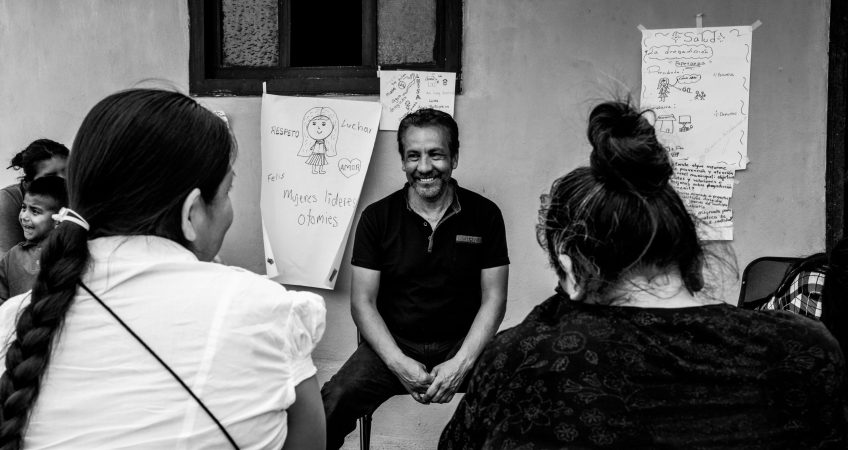
In the Heart of Empowerment: Jorge Echeverria
In this interview, we delve into the remarkable journey of our General Coordinator Jorge Echeverría, the visionary leader steering the mission of PSYDEH. With a background in psychology and a profound commitment to human rights, Jorge’s story is one of resilience and empowerment. Jorge’s experiences have shaped his unwavering dedication to community organization. Join us as we uncover the inspiring narrative of Jorge Echeverría’s impactful work with PSYDEH.
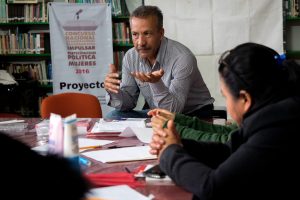
How did PSYDEH came to be?
After living in Hidalgo for seven years, getting to know different local and national organizations, I had the opportunity to participate in a Diploma on Professionalization of Civil Society Organizations endorsed by the MORA Institute and the INDESOL Institute of Social Development.
My interest in human rights advocacy marked the need to develop promotion and defense actions in the most vulnerable communities of Valle de Tulancingo. This is where we started working as a collective of four women and myself, engaging in human rights issues.
From this experience, PSYDEH was born as a Civil Society Organization.
What is your age, and what is your current role within PSYDEH?
I am 58 years old; I am a professional psychologist. Currently, I work full-time as the General Coordinator of PSYDEH, but in previous years, I have been able to combine my time at PSYDEH with other activities such as:
- Teaching for the Social Sciences department at the Autonomous University of the State of Hidalgo for the High School section in the Tulancingo region, Hidalgo.
- Coordinating Social Development Projects with United Nations Organizations in Guatemala and Civil Society Organizations in Mexico.
In each of the projects executed, I have had to coordinate technical teams of professionals, teams from local organizations, technicians from government agencies, and representatives from civil society both in Guatemala and in Mexico.
I’ve consulted for both national and international organizations, overseeing the monitoring and evaluation of projects initiated by non-governmental and development entities.
I have been a consultant and trainer on topics such as Citizen Participation, Democracy and Governance, Strategic Planning, Citizenship Building, Human Rights, Risk Management, Project Development and Management, Building Masculinity, and Leadership.
I’ve conducted experiential workshops on these subjects, employing the Popular Education methodology. This approach utilizes participatory techniques, empowering participants across diverse groups, including children, youth, adults, farmers, and indigenous communities.
- Alternate Counselor of the Citizen Advisory Council of the Law for the Promotion of Activities of Civil Society 2013 – 2016.
- Representative Counselor of Civil Organization of the Advisory Council of the National Commission for the Development of Indigenous Peoples, CDI 2015 – 2018.
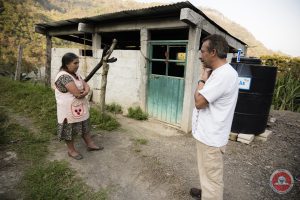
What motivated you to establish PSYDEH?
Since 1976, my life has had great moments; at the age of 11 in my country Guatemala, we had an earthquake of 6.5 magnitude. At that time, many houses were made of adobe and tile roofs. The majority of these houses did not withstand the earthquake, causing extensive material damage and loss of life. My family and many others had to improvise with plastic sheets and makeshift shelters to live, and this went on for more than 60 days. I remember that despite the lack of electricity, water, and food, people began to organize and develop collective support programs where the entire community felt safe and could ensure their daily sustenance.
It was incredible to witness the community’s resilience, providing essential services and organizing activities for the youth. Guatemala’s history is marked by over four decades of internal conflicts, military rule, and frequent coups, leading to a loss of individual rights for its citizens.
In 1988, I entered university to study a degree in Psychology.
In 1992, I joined a United Nations program to develop a Mental Health project in one of the areas most affected by the internal conflict; where the Guatemalan army burned and destroyed hundreds of communities. The survivors took refuge in the mountains and at the border with Mexico. Here, once again, I realized the importance of organization. Groups of farmers began to organize into small collectives and little by little returned to their original communities, where they had to start rebuilding their houses from scratch.
These two experiences made me realize that organizations play an extremely important role in people’s lives. For these reasons, I see that the work of PSYDEH, focused on community organization, is the key to development from the bottom up.
 What have you learned during your time with PSYDEH?
What have you learned during your time with PSYDEH?
PSYDEH has strengthened me as a human being. With PSYDEH, I have had the opportunity to work with a large family of collaborators, volunteers from more than 10 countries, wonderful people who have given and continue to give their best in PSYDEH’s programs.
PSYDEH has allowed me to get to know a team of professional women motivated to learn and share their knowledge with their communities. Being part of this training process where I can offer my experiences, but more importantly, where we can all build together and be participants in community development is invaluable.
PSYDEH has allowed me to confirm that the people who live in the rural communities of Hidalgo, despite facing great challenges in achieving well-being standards, are motivated to participate in processes of community organization that strengthen and empower them, generating skills to be the main actors in their community development, creating a bottom-up process in harmony with their environment.
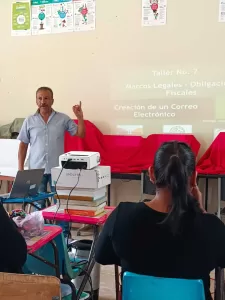
If you were to recommend that someone volunteer or get involved with PSYDEH, why would that be?
PSYDEH is a safe space for the exchange of learning;
– On a professional level, they will find a multidisciplinary and multicultural team,
– They’ll experience diverse climates, from cool woodlands at 3°C to tropical jungles at 35-40°C, amidst stunning landscapes.
– Culturally, they will be able to interact with three indigenous groups (Otomí – Tepehua – Nahuatl) with ancient customs and worldviews.
In the last 5 years, PSYDEH has had volunteers who have been amazed by their stay in the Otomí-Tepehua region.
Jorge Echeverría’s dedication to empowering communities through PSYDEH is nothing short of inspirational. His journey, marked by a deep-rooted commitment to human rights and a profound understanding of the transformative power of community organization, serves as a beacon of hope for vulnerable populations in Hidalgo. We are proud to serve alongside him and the communities, and consider ourselves very fortunate to have had the opportunity to work with him. Jorge Echeverría’s story is a testament to the resilience of the human spirit and the profound impact one can have in building a brighter future for communities in need.

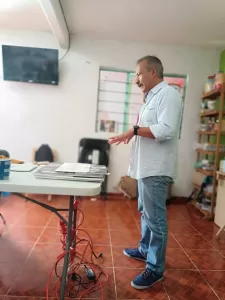 What have you learned during your time with PSYDEH?
What have you learned during your time with PSYDEH?